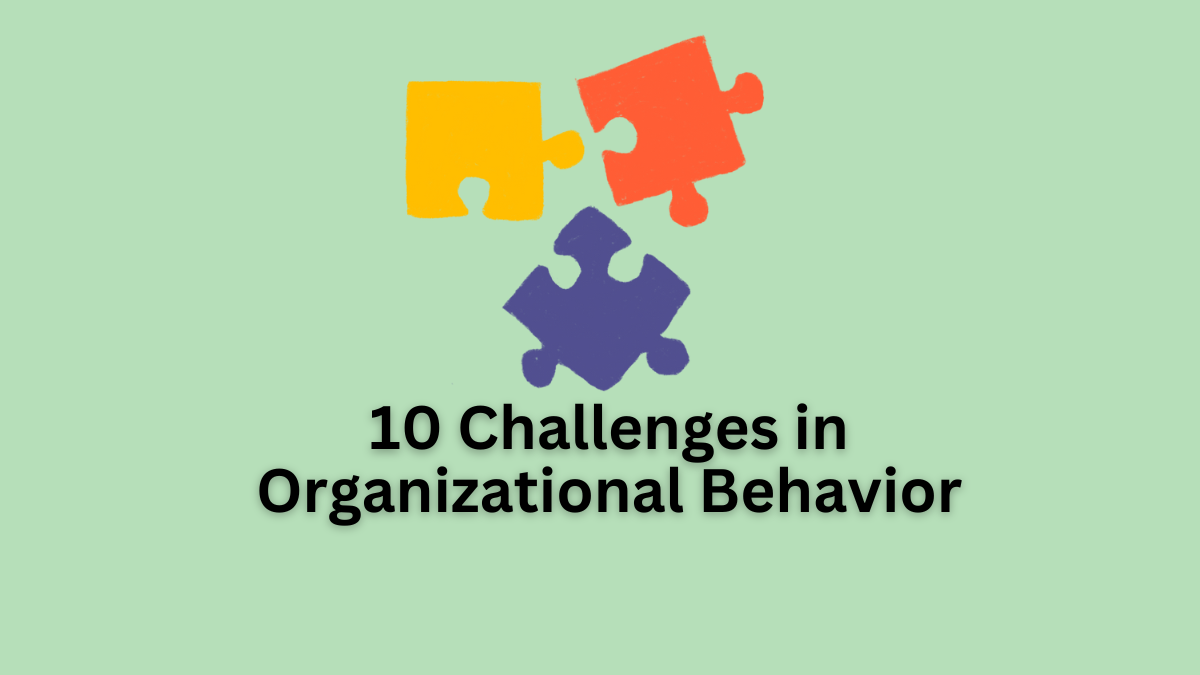What is Organizational Behavior?
Organizational Behavior (OB) is the study of human behavior and interactions within an organization and with other organizations. It encompasses the understanding of individual behavior, group dynamics, and the impact of organizational structure and culture on employee performance and satisfaction.
OB aims to improve organizational effectiveness by identifying and addressing challenges related to leadership, communication, motivation, and decision-making. Here, we will explore 10 challenges in organizational behavior and strategies to overcome them.
Challenges in Organizational Behavior
The following are the 10 common challenges in organizational behavior (OB):
Resistance to Change
Employees may resist organizational changes due to fear of the unknown or discomfort with new processes. Strategies to overcome resistance include involving employees in the change process, providing clear communication, and offering training and support to facilitate adaptation.
Communication Barriers
Ineffective communication can hinder collaboration, decision-making, and productivity. Overcoming communication barriers involves promoting open communication channels, providing communication training, and fostering a culture of transparency and feedback.
Lack of Trust and Transparency
When employees perceive a lack of trust and transparency from leadership, it can lead to disengagement and low morale. Building trust requires leaders to be honest, transparent, and accountable in their actions. Encouraging open dialogue and involving employees in decision-making processes can also foster trust.
Conflicting Values and Goals
Organizations may face challenges when individual values and goals clash with those of the organization. Creating alignment requires establishing a shared vision and values, promoting collaboration, and resolving conflicts through effective communication and conflict-resolution techniques.
Leadership Challenges
Poor leadership can contribute to various organizational behavior issues, including low morale, ineffective communication, and resistance to change. Developing strong leadership skills and promoting a supportive leadership culture can help overcome these challenges.
Read More: 10 Challenges in Management Information Systems
Workplace Diversity
Managing a diverse workforce requires understanding and valuing differences in culture, background, and perspective. Organizations can overcome diversity challenges by promoting inclusion, offering diversity training, and implementing policies that foster equality and respect.
Employee Engagement
Disengaged employees may lack motivation and commitment, leading to decreased productivity and retention. Strategies to improve engagement include providing opportunities for growth and development, recognizing and rewarding achievements, and fostering a positive work environment.
Work-Life Balance
Balancing work and personal life is essential for employee well-being and productivity. Organizations can support work-life balance by offering flexible work arrangements, promoting time management skills, and encouraging employees to prioritize self-care.
Ethical Dilemmas
Ethical challenges may arise when organizational decisions conflict with values or societal expectations. Establishing ethical guidelines, providing ethics training, and creating channels for reporting unethical behavior can help address these dilemmas.
Read More: 10 Challenges in Quality Management
Conflict Resolution
Interpersonal conflicts can disrupt teamwork and collaboration, affecting organizational performance. Implementing conflict resolution strategies, such as mediation and negotiation, and fostering a culture of respect and open communication can help resolve conflicts effectively.
Strategies To Overcome Challenges in Organizational Behavior
Below are the 10 strategies to overcome challenges in organizational behavior:
Effective Leadership Development
Invest in leadership development programs to cultivate strong leadership skills and promote a supportive leadership culture.
Communication Training
Provide communication training for employees and leaders to improve interpersonal communication skills and foster a culture of open dialogue.
Change Management
Implement change management strategies that involve employees in the change process, provide clear communication, and offer support and resources to facilitate adaptation.
Read More: 10 Challenges in Total Quality Management
Diversity and Inclusion Initiatives
Develop diversity and inclusion initiatives to promote equality, respect, and understanding among employees from diverse backgrounds.
Employee Engagement Programs
Implement employee engagement programs that recognize and reward achievements, provide opportunities for growth and development, and foster a positive work environment.
Work-Life Balance Policies
Establish work-life balance policies that offer flexible work arrangements, promote time management skills, and encourage employees to prioritize self-care.
Read More: 10 Challenges in Change Implementation
Ethics Training
Provide ethics training for employees and leaders to raise awareness of ethical issues, establish ethical guidelines, and create channels for reporting unethical behavior.
Conflict Resolution Mechanisms
Implement conflict resolution mechanisms, such as mediation and negotiation, and foster a culture of respect and open communication to resolve conflicts effectively.
Performance Management Systems
Develop performance management systems that provide regular feedback, opportunities for skill development, and recognition for achievements to enhance employee satisfaction and motivation.
Organizational Culture Development
Foster a positive organizational culture that values transparency, trust, and collaboration through leadership modeling, communication practices, and reinforcement of desired behaviors.
Read More: 10 Challenges in Organizational Development
